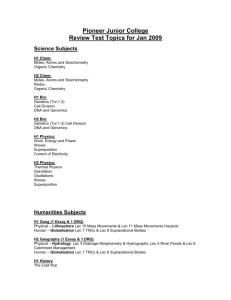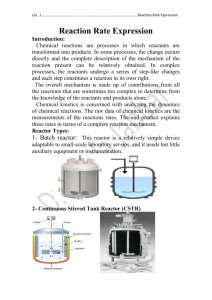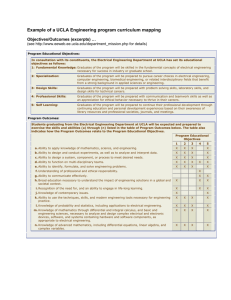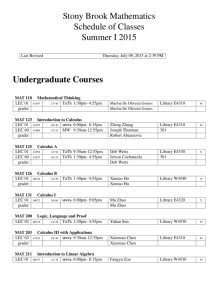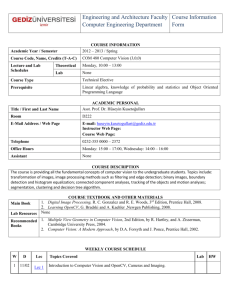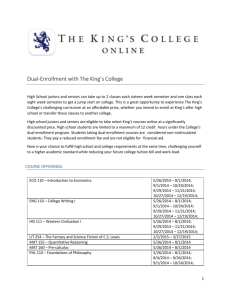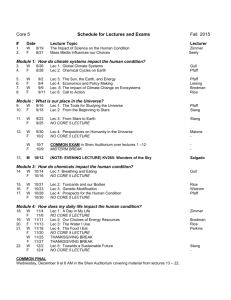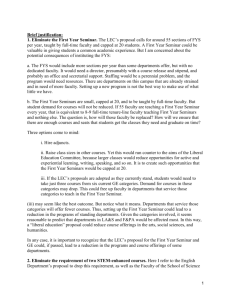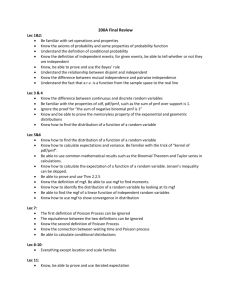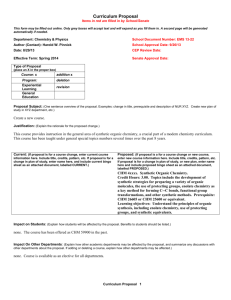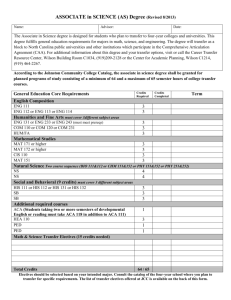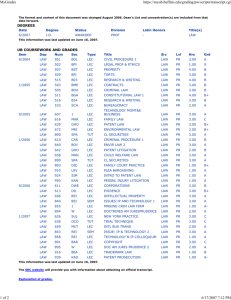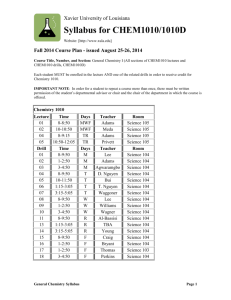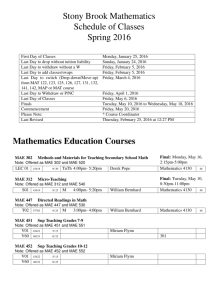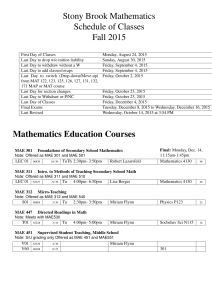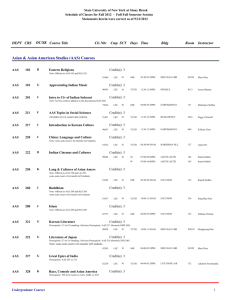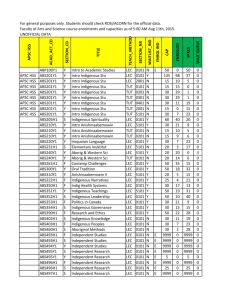Lower division general education coursework
advertisement
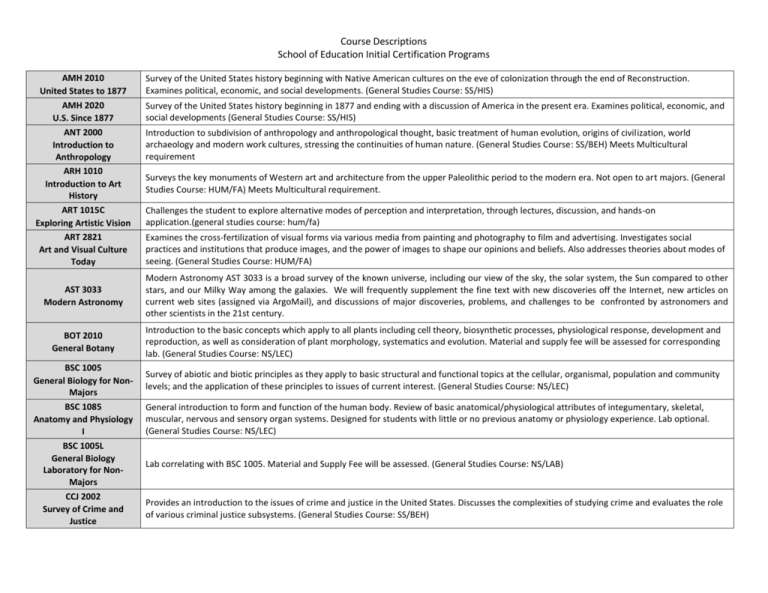
Course Descriptions School of Education Initial Certification Programs AMH 2010 United States to 1877 AMH 2020 U.S. Since 1877 ANT 2000 Introduction to Anthropology ARH 1010 Introduction to Art History ART 1015C Exploring Artistic Vision ART 2821 Art and Visual Culture Today AST 3033 Modern Astronomy BOT 2010 General Botany BSC 1005 General Biology for NonMajors BSC 1085 Anatomy and Physiology I BSC 1005L General Biology Laboratory for NonMajors CCJ 2002 Survey of Crime and Justice Survey of the United States history beginning with Native American cultures on the eve of colonization through the end of Reconstruction. Examines political, economic, and social developments. (General Studies Course: SS/HIS) Survey of the United States history beginning in 1877 and ending with a discussion of America in the present era. Examines political, economic, and social developments (General Studies Course: SS/HIS) Introduction to subdivision of anthropology and anthropological thought, basic treatment of human evolution, origins of civilization, world archaeology and modern work cultures, stressing the continuities of human nature. (General Studies Course: SS/BEH) Meets Multicultural requirement Surveys the key monuments of Western art and architecture from the upper Paleolithic period to the modern era. Not open to art majors. (General Studies Course: HUM/FA) Meets Multicultural requirement. Challenges the student to explore alternative modes of perception and interpretation, through lectures, discussion, and hands-on application.(general studies course: hum/fa) Examines the cross-fertilization of visual forms via various media from painting and photography to film and advertising. Investigates social practices and institutions that produce images, and the power of images to shape our opinions and beliefs. Also addresses theories about modes of seeing. (General Studies Course: HUM/FA) Modern Astronomy AST 3033 is a broad survey of the known universe, including our view of the sky, the solar system, the Sun compared to other stars, and our Milky Way among the galaxies. We will frequently supplement the fine text with new discoveries off the Internet, new articles on current web sites (assigned via ArgoMail), and discussions of major discoveries, problems, and challenges to be confronted by astronomers and other scientists in the 21st century. Introduction to the basic concepts which apply to all plants including cell theory, biosynthetic processes, physiological response, development and reproduction, as well as consideration of plant morphology, systematics and evolution. Material and supply fee will be assessed for corresponding lab. (General Studies Course: NS/LEC) Survey of abiotic and biotic principles as they apply to basic structural and functional topics at the cellular, organismal, population and community levels; and the application of these principles to issues of current interest. (General Studies Course: NS/LEC) General introduction to form and function of the human body. Review of basic anatomical/physiological attributes of integumentary, skeletal, muscular, nervous and sensory organ systems. Designed for students with little or no previous anatomy or physiology experience. Lab optional. (General Studies Course: NS/LEC) Lab correlating with BSC 1005. Material and Supply Fee will be assessed. (General Studies Course: NS/LAB) Provides an introduction to the issues of crime and justice in the United States. Discusses the complexities of studying crime and evaluates the role of various criminal justice subsystems. (General Studies Course: SS/BEH) Course Descriptions School of Education Initial Certification Programs CGS 2060 Excursions in Computing CHM 1020 Concepts in Chemistry CHM 1032 Fundamentals of General Chemistry Explore and understand the role of computing in today’s highly technological world. Examine the effective and ethical use of computing technology to address general and specialized domains and practice project delivery deadlines involving this technology. Topics include: role of computing, recent advances in computer hardware, system software options, system connectivity, time management and presentation technology, tools for researching current technology, algorithms, and limits of computing ethics. (General Studies Course: NAT/LEC) Introduces the non-scientist to current and critical issues in chemistry. Readings from popular science publications. Discussion on topics such as polymers, radioactivity, toxic chemicals, energy, etc. Registration for the corresponding lab is encouraged but not required. (General Studies Course: NS/LEC) A one semester course presenting an introduction to the principles of general chemistry. Designed for students majoring in sciences other than biology and chemistry. Cannot be used to satisfy major requirements in chemistry or biology. (General Studies Course: NS/LEC) CHM 2045 General Chemistry I Chemical and physical properties, relationship between observables and concepts and the development of a theoretical framework. Topics will include atomic and molecular structure, theories of bonding, properties of the elements and periodicity. (General Studies Course: NS/LEC) A grade of "C-" or higher is required in prerequisite courses. CHM 2045L General Chemistry I Laboratory Introduction to laboratory safety, experimental techniques, graphing of data, chemical reactivity and separations, calorimetry and volumetric analysis. Material and supply fee will be assessed. Students taking CHM 2045 concurrently are required to withdraw from CHM 2045L if they withdraw from CHM 2045. (General Studies Course: NS/LAB) A grade of "C-" or higher is required in prerequisite courses. CPO 2002 Introduction to Comparative Politics The course examines several countries around the world to compare their political systems, economies, and societies. The countries studied vary in terms of level of economic development as well as geographic location. The course is arranged to emphasize the timing and process of development, institutional arrangements of government, as well as the importance of culture in national identity. Topics of discussion include the global rich / poor gap, culture clash among civilizations, the meaning of the nation state in the twenty-first century, the relationship between religion and politics, the Islamic fundamentalist challenge, ethnicity and nationalism, exporting democracy, civic values and participation. Contemporary issues in each country will be examined. Attention will be given to the ways that democratic states differ, despite their common governmental system of democracy. However, other systems of government besides democracy will also be considered including communism and theocracy. Through this course, students will develop an understanding of each country, as well as develop criteria for comparing similarities and differences across countries. A main component of this course is a short research paper dealing with one country outside of the United States and a contemporary problem that it confronts. DEP 2004 Human Development Across the Lifespan ECO 2013 Principles of Economics Macro ECO 2023 Principles of Economics Micro EEX 2010 Introduction to Exceptional Children Survey of major themes and recent findings in the area of human development across the life span. Emphasis will be on the major transitions from fetal development through death in the physical, cognitive, social, and emotional domains. The impact of ethnic, gender, and cultural factors on development will be examined. (General Studies Course: SS/BEH) Introduction to economics with emphasis on the study of aggregate economic activity, national income, price level determination, and economic growth and development. (General Studies Course: SS/SOC) Introduction to economics with an emphasis on the determination of prices in the market economy and their role in allocating commodities and economic resources to various users. Study of market structure and efficiency. This course is recommended to be taken after ECO 2013. This course is designed to introduce students to basic concepts and practices in special education and to help prepare future teachers for their work as part of an instructional team working with diverse learners. Course Descriptions School of Education Initial Certification Programs EME 2040 Introduction to Educational Technology EUH 1000 Western Perspectives I EUH 1001 Western Perspectives II GEA 2000 Nations and Regions of the World GEO 1200 Physical Geography GEO 1200L Physical Geography Lab GLY 2010 Physical Geology GLY 2010L Physical Geology Laboratory HLP 2081 Health, Nutrition & Physical Fitness HSC 2100 Personal Health HSC 2577 Principles of Nutrition HSC 3406 Advanced First Aid and Emergency Care Assists educators in developing skills and competencies which are essential to the integration of technology into the delivery of classroom instruction. Students will survey a wide variety of instructional technology materials and systems. They will also learn to use these tools in a classroom environment. EUH 1000, Western Perspectives I, is a study of the West's geographical, cultural, political, and economic environments, with an emphasis on how the development of the Western World is part of a larger process of historical development. This course is designed to provide a broad basis of knowledge of western civilization from the dawn of prehistory to c. 1650. In addition to studying the development of cultures and societies from the earliest Mesopotamian cultures, the students will also explore the origins of major religions, the development of western political structures, and the textual and material culture left behind by those peoples. All of those aspects of history, major influences on current societies in Europe and the western hemisphere, are increasingly apparent in cultures throughout the world in this age of a truly global society. Study of the West's geographical, socio-cultural, political and scientific developments with an emphasis on how changes in these areas helped to shape civilization in the West, influenced the non-western world, and provided insight into the current conditions in the West and its relationship with the global community. (General Studies Course: SS/HIS) Meets Multicultural requirement. Regional treatment of the physical & cultural environments of the world. Interdependence of peoples and nations of the world will be stressed within the context of environmental attributes and shortcomings and human responses to environmental opportunities or limitations. (General Studies Course: SS/SOC) Meets Multicultural requirement. Relationship between natural environment and man. Weather, climate, soils, biogeography and land forms. Physical earth treated so that the student gains appreciation of man's place and activities within his/her environment. (General Studies Course: NS/LEC) Material and supply fee will be assessed for corresponding lab. Material, structures, surface features of the earth and processes that have produced them. (General Studies Course: NS/LEC) Lab correlating with GLY 2010. (General Studies Course: NS/LAB) Material and supply fee will be assessed. This course is designed to help each student understand the value of wellness or total well being and acquire the knowledge necessary to achieve it. The course covers the interrelationships among six aspects of wellness: physical, emotional, social, intellectual, spiritual, and environmental. Emphasis is placed on the physical dimension of wellness, particularly physical fitness, stress management, and nutrition. This course provides information on personal health issues from which students may base current and future decisions regarding their health and wellness. The course promotes an environment where effective decision making skills can be acquired through structured group interaction. Explores fundamental principles of nutrition emphasizing the promotion of human growth and health. Provides students with an understanding of nutrients and their roles in the body while examining current issues in food science. First Aid-Responding to Emergencies will provide consistent guidelines that enable the citizen responder to give appropriate care, regardless of the type of emergency until medical help arrives. Components covered in this course include Adult, Child and Infant CPR, First Aid, and Adult/Child AED. Course Descriptions School of Education Initial Certification Programs INR 2002 Introduction to International Relations MAC1105 College Algebra MAC 1114 Trigonometry MAC 2311 Analytic Geometry and Calculus I MAC 2312 Analytic Geometry and Calculus II MGF 1106 Math for Liberal Arts I MGF 1107 Math for Liberal Arts II MMC 2000 Principles of Mass Communication MUH 2930 – Concerts MUH 2930 - Films The Music Experience: Special Topics MUL 2110 Music in Western Civilization PHY 1020 Introduction to Concepts in Physics This course is an introduction to the study of International Relations and, as such, is designed to introduce key concepts and theories of the field. In this course, we will survey: (1) three theoretical traditions in IR; (2) major causes and outcomes of war; (3) international institutions/organizations and cooperation; (4) international political economy; and (5) theories of foreign policy. Provides the concepts and techniques of algebra that are needed to understand subjects such as statistics and economics which contain a considerable amount of quantitative reasoning. Is additionally a preparatory course for the study of calculus. Major topics include: the concept of functions, graphs of functions and relations, operations on functions, rational functions, exponentials and logarithms, systems of equations and inequalities, applications. Prerequisite course or appropriate score on placement test is required. Students may earn 3 semester hours credit toward Gordon Rule for MAC 1105. (Gordon Rule Course: Theoretical Math and General Studies Course: MAT/ALG) Trigonometric functions, their properties and graphs, inverse trigonometric functions, their properties and graphs, trigonometric identities, conditional trigonometric equations; solutions of triangles, vector algebra, parametric equations, polar coordinates, applications. College Algebra or a strong high school algebra background is required. (Gordon Rule Course: Theoretical Math and General Studies Course: MAT/MAT). Differential and Integral Calculus of Algebraic, Trigonometric, and Transcendental functions of single variables. Related applications. Continuation of MAC 2311. Transcendental Functions, methods of integration, sequences and series, further analytic geometry and applications. Presents topics that illustrate both the aesthetic aspects and the practical applications of mathematics. Intended for students who require only general education mathematics courses. Major course topics: systematic counting, probability, statistics, history of mathematics, geometry, sets, logic. (Gordon Rule Course: Theoretical Math) and (General Studies Course: MAT/MAT) Presents topics that supplement those in MGF 1106 needed by elementary teachers. Intended for students in elementary education. Major topics: number sets and properties, number theory, geometry, measurement, graphs--all taught within a problem solving approach. (Gordon Rule Course: Theoretical Math) and (General Studies Course: MAT/MAT). Principles, issues, organizations and functions of film, radio, television, print and other media of mass communication. Consideration of current practices and recent developments and their implications for the future direction of mass media. (General Studies Course: SS/SOC) With a non-traditional and multi-cultural approach, specific topics in music are offered each semester. Topics vary each semester but include such areas as Latin American Music, Jazz, Eastern European Music, Music of the Far East, etc. Consult the current course bulletin for semester topic. (General Studies Course: HUM/FA) Meets Multicultural requirement. Musical perspectives within Western civilization. Designed to express the correlation of music, art, and literature with Western culture. Special emphases include the nature of music, both past and present, and music as reflection/expression of society's vital activities. (General Studies Course: HUM/FA). Credit cannot be earned in both MUH 2110 and MUL 2110. An introductory survey of the natural laws of the universe. Presents the basic concepts associated with the scientific method, force and motion, matter and energy, electricity and magnetism, the atom and the solar system. Open to elementary education and other non-science majors. (General Studies Course: NS/LEC) Course Descriptions School of Education Initial Certification Programs PHY 2048 University Physics I PHY 2053 General Physics I PHY 2053L General Physics I Laboratory PHY 2054 General Physics II POS 2041 American Politics PSY 2012 General Psychology STA 2023 Elements of Statistics SYG 2000 Introduction to Sociology SYG 2010 Current Social Problems ZOO 1010 General Zoology Linear and rotational motion of objects in 1, 2, and 3 dimensions, concepts of work and energy, oscillations and waves, heat and thermodynamics. (General Studies Course: NS/LEC) Mechanics, heat, waves, and sound. (General Studies Course: NS/LEC) Selected experiments in mechanics, oscillatory motion, and heat. (General Studies Course: NS/LAB) Continuation of PHY 2053. Light, electricity and magnetism; elementary quantum theory; atomic, nuclear and particle physics. (General Studies Course: NS/LEC) The objective of this course is to provide you with a basic introduction to the workings of American government and politics. This course consists of the study of the constitution, government, and federal structure of the United States. Federal, state, and local problems and issues will be considered in the context of American political culture and history. Special emphasis will be placed on the United States Constitution, the political principles that underlie it, the historical context in which it was framed and contemporary interpretations. By the end of the course you should have gained insight into the political forces and institutions that shape our society and, reciprocally, the social forces that influence our government. A survey of methods, theories, and body of knowledge of contemporary psychology, including such topics as learning, motivation, sensation and perception, development, thinking, personality, social behavior, psychological adjustment, and methods of therapy. (General Studies Course: SS/BEH) Fundamental statistical concepts. Probability, inference, estimation, hypothesis testing. (Gordon Rule Course: Applied Math) and (General Studies Course: MAT/MO) Fundamental principles concerning social relationships, social interaction and social structure. (General Studies Course: SS/SOC) SYG2010 is a study of major social issues affecting individuals in groups in modern industrial societies. In particular, social problems in America will be explored through the interpretation of film. (General Studies Course: SS/SOC). Introduction to the basic principles in animal biology presented as an integrated review of morphology, physiology, genetics, development, systematics, evolution and ecology. Provides foundation for further study in zoology. Material and supply fee will be assessed for corresponding lab. (General Studies Course: NS/LEC)
